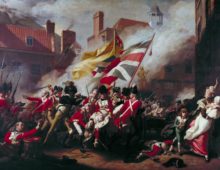Welsh project digitises documents from the Newport Chartist Uprising of 1839
May 7, 2019 - Richard Moss in News & Blog Posts, News

John Frost – Welsh Chartist. A portrait from the Welsh Portrait Collection at the National Library of Wales. Public Domain
This fascinating project, which launched in 2016 in Wales, has seen volunteers working to transcribe more than 3,000 important documents gathered together shortly after the famous Newport Chartist Rising of November 3rd and 4th 1839.
Unlocking the Chartist Trials uses online volunteers to transcribe the court records relating to the famous Rising, which is cited as Britain’s last major armed rebellion against authority.
The early reign of Queen Victoria saw Chartism flourish in working class areas across Britain and, following the rejection of the First Chartist Petition in the House of Commons in July 1839, discontent grew.
In Wales, particularly in the working class mining county of Monmouthshire, Chartism found a ready groundswell of support and a violent flashpoint came in Newport when nearly 10,000 Chartist sympathisers, led by local Chartist leader John Frost, marched on the town. Many of them were coal miners and some were armed with home-made arms; their goal was to free a number of fellow Chartists who they believed had been taken prisoner in the town’s Westgate Hotel.
As they approached the hotel, troops were lying in wait for them. In the skirmish that followed, about 22 of the demonstrators were killed – some of them left to die from their wounds in the street. Others melted away and died at home.
In the subsequent trial, which took place the following month in Monmouth’s Shire Hall, the leaders of the rebellion, including John Frost, were convicted of treason and sentenced to be hanged, drawn and quartered. After an outcry and petition signed by people across the country, the heavy sentence was commuted to transportation to Tasmania. Frost and the other deportees were eventually pardoned in 1856.
Some of the documents being transcribed were used in the sensational treason trial that took place in Monmouth’s Shire Hall the following month and they offer a fascinating glimpse into one of the most tumultuous periods in Britain’s history – and the competing voices in the fight for parliamentary reform and the male dominated push for suffrage in the age of revolution.
To follow the progress of the project visit http://chartist.cynefin.wales/ which, as well as hosting digitised copies of the documents, (many of which have been now been transcribed) held by Gwent Archives and Newport Reference Library, also contains links to resources and histories charting the history of uprising and Chartism in Monmouthshire and South Wales.


